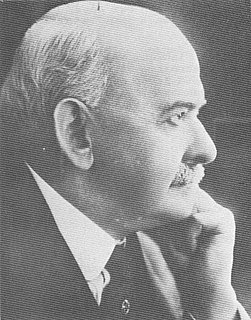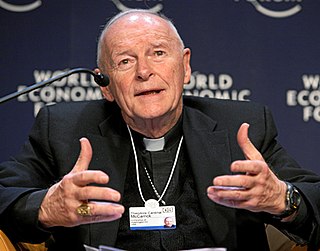A Quote by Robert Anderson
Men point to the sad incidents of human life on earth, and they ask "Where is the love of God?" God points to that Cross as the unreserved manifestation of love so inconceivably infinite as to answer every challenge and silence all doubt for ever. And that Cross is not merely the public proof of what God has accomplished; it is the earnest of all that He has promised.
Related Quotes
When we look at the cross we see the justice, love, wisdom and power of God. It is not easy to decide which is the most luminously revealed, whether the justice of God in judging sin, or the love of God in bearing the judgment in our place, or the wisdom of God in perfectly combining the two, or the power of God in saving those who believe. For the cross is equally an act, and therefore a demonstration, of God’s justice, love, wisdom and power. The cross assures us that this God is the reality within, behind and beyond the universe.
The third major characteristic of God - "infinitude" - is the catchall, the universal modifier of Christian theology. God is not merely a being; he is infinite being. God is not merely good; he is infinite goodness. God is not merely wise; he is infinite wisdom. And so on down the list. God is exaggeration run amuck.
Let the average man be put to the proof on the question of who is above, and his true position will be exposed. Let him be forced into making a choice between God and money, between God and men, between God and personal ambition, God and self, God and human love, and God will take second place every time.
The spot where God's triumph is achieved, God's victory over sin, over lawlessness, is the cross of Calvary- the cross on which the Son of God died. In that cross and through the cross the works of the devil were destroyed, and the One who conquered him is yet to bruise the serpent's head in the final triumph when He comes again, as recorded in prophecy.
Before the coming of Jesus Christ, men fled away from God and, being attached to the earth, refused to unite themselves to their Creator. But the loving God has drawn them to Himself by the bonds of love, as He promised by the prophet Osee [Hosea]: "I will draw them with the cords of Adam, with the bonds of love" (11:4). These bonds are the benefits, the lights, the calls to His love, the promises of Paradise which He makes to us, but above all, the gift which He has bestowed upon us of Jesus Christ in the Sacrifice of the Cross and in the Sacrament of the Altar.
To some, the image of a pale body glimmering on a dark night whispers of defeat. What good is a God who does not control his Son's suffering? But another sound can be heard: the shout of a God crying out to human beings, "I LOVE YOU." Love was compressed for all history in that lonely figure on the cross, who said that he could call down angels at any moment on a rescue mission, but chose not to - because of us. At Calvary, God accepted his own unbreakable terms of justice. Any discussion of how pain and suffering fit into God's scheme ultimately leads back to the cross.
"God is love". His is not a sentimental, emotional kind of love but the love of the Father who is the origin of all life, the love of the Son who dies on the Cross and is raised, the love of the Spirit who renews human beings and the world. Thinking that God is love does us so much good, because it teaches us to love, to give ourselves to others as Jesus gave himself to us and walks with us. Jesus walks beside us on the road through life.
The most violent expression of God's wrath and justice is seen in the Cross. If ever a person had room to complain for injustice, it was Jesus. He was the only innocent man ever to be punished by God. If we stagger at the wrath of God, let us stagger at the Cross. Here is where our astonishment should be focused.
If it were not for the Eucharist, if it were not for this marvelous manifestation of God's love, if it were not for this opportunity to place ourselves in the very real presence of God, if it were not for the sacrament that reminds us of His love, His suffering and His triumph, which indeed perpetuates for us His saving sacrifice on the cross, I am sure that I could never face the challenges of my life, my own weakness and sinfulness and my own need to reach out to the Living God.
Accommodation is a central aspect of the cross-centered interpretation of violent portraits of God that I'm advocating. Like everything else in Cross Vision, this concept is anchored in the cross. On the cross, God stoops to meet us, and to enter into solidarity with us, right where we are at, which is in bondage to sin and to Satan. And he does this to free us and to bring us where he wants us to be, which is united with him in Christ. The cross is thus the paradigmatic example of God mercifully stooping to accommodate people in their fallen conditioning.
At the cross in holy love God through Christ paid the full penalty of our disobedience himself. He bore the judgment we deserve in order to bring us the forgiveness we do not deserve. On the cross divine mercy and justice were equally expressed and eternally reconciled. God's holy love was 'satisfied.'
God is Infinite and His Shadow is also infinite. The Shadow of God is the Infinite Space that accommodates the infinite Gross Sphere which, with its occurrences of millions of universes, within and without the ranges of men's knowledge, is the Creation that issued from the Point of Finiteness in the infinite Existence that is God.
Why pray? Evidently, God likes to be asked. God certainly does not need our wisdom or our knowledge, nor even the information contained in our prayers ("your Father knows what you need before you ask him"). But by inviting us into the partnership of creation, God also invites us into relationship. God is love, said the apostle John. God does not merely have love or feel love. God is love and cannot not love. As such, God yearns for relationship with the creatures made in his image.




































